Sea Point Days est un film Sud africain de genre Documentaire
Sea Point Days (2008)

Si vous aimez ce film, faites-le savoir !
- Infos
- Casting
- Infos techniques
- Photos
- Vidéos
- Passages TV
- Citations
- Personnages
- Musique
- Récompenses
Durée 1h36
OrigineAfrique du sud
Genres Documentaire
Themes Afrique post-coloniale, Le racisme, Documentaire sur la discrimination, Documentaire sur le droit, Documentaire sur une personnalité, Documentaire sur la politique, Documentaire sur les villes, Politique
Note68%










Sea Point Days est un film documentaire sud-africain réalisé par François Verster, sorti en 2008.
Synopsis
Le long du centre urbain le plus au méridional de l’Afrique, gît une bande de terrain très particulière qui sépare la ville de l’océan. D’un côté bordé par l’Océan Atlantique en belle toile de fond et de l’autre par Signal Hill, la promenade maritime – et les piscines publiques en son milieu – forme un espace comme il n’en existe pas d’autre au Cap. Autrefois bastion de l’Apartheid, c’est aujourd’hui un lieu unique pour son apparente mixité d’âges, de races, de genres, de religions, de statuts sociaux ou d’orientations sexuelles. D’une certaine manière cet espace est devenu l’un de ceux où les sud-africains sentent qu’ils ont le droit d’exister – et où, par conséquent, les possibilités d’être heureux dans un monde divers sont envisageables.Commentaires
Postez un commentaire :
Suggestions de films similaires à Sea Point Days
Il y a 8965 ayant les mêmes genres cinématographiques, 11356 films qui ont les mêmes thèmes (dont 0 films qui ont les mêmes 8 thèmes que Sea Point Days), pour avoir au final 70 suggestions de films similaires.Si vous avez aimé Sea Point Days, vous aimerez sûrement les films similaires suivants :

Mugabe et l'Africain blanc (2009)
, 1h30Origine Royaume-uni
Genres Documentaire
Thèmes Afrique post-coloniale, L'environnement, Le racisme, Documentaire sur le monde des affaires, Documentaire sur la discrimination, Documentaire sur le droit, Documentaire sur l'environnement, Documentaire sur une personnalité, Documentaire sur la politique, Politique
Note76%





En 2008, Mike Campbell – l’un des derniers fermiers blancs au Zimbabwe face au violent programme de réforme agraire – prend le risque sans précédent d’attaquer le Président Robert Mugabe devant le tribunal du SADC (Communauté de Développement Sud-Africain) afin de défendre ses droits. Son exploitation agricole emploie plus de 500 travailleurs et abrite également leurs familles. Mike Campbell accuse Mugabe et son gouvernement de discrimination raciale et de violation des Droits de l’Homme. Embarqués dans un procès hors du commun, Mike et sa famille vont devoir faire face à la violence et à la cruauté du régime du dictateur. Ce documentaire retrace leur combat.
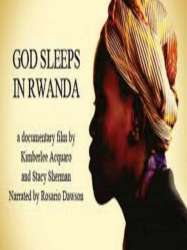
God Sleeps in Rwanda (2005)
, 28minutesGenres Documentaire
Thèmes Afrique post-coloniale, Le racisme, Documentaire sur la discrimination, Documentaire sur le droit, Documentaire sur la guerre, Documentaire historique, Documentaire sur une personnalité, Documentaire sur la politique, Politique
Acteurs Rosario Dawson
Note71%






Origine Etats-Unis
Genres Documentaire
Thèmes Afrique post-coloniale, Le racisme, Documentaire sur la discrimination, Documentaire sur le droit, Documentaire sur une personnalité, Documentaire sur la politique, Politique
In the 1950s South Africans realized that their freedom struggle had to be built in four arenas of action: mass action, underground organization, armed struggle, and international mobilization. Have You Heard From Johannesburg takes viewers inside that last arena, the movement to mobilize worldwide citizen action to isolate the apartheid regime. Inspired by the courage and suffering of South Africa’s people as they fought back against the violence and oppression of racism, foreign solidarity groups, in cooperation with exiled South Africans, took up the anti-apartheid cause. Working against heavy odds, in a climate of apathy or even support for the governments of Hendrik Verwoerd, John Vorster and P.W. Botha, campaigners challenged their governments and powerful corporations in the West to face up to the immorality of their collaboration with apartheid.
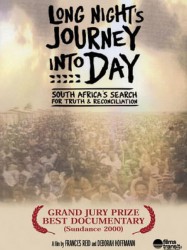 , 1h34
, 1h34Origine Etats-Unis
Genres Documentaire
Thèmes Afrique post-coloniale, Le racisme, Documentaire sur la discrimination, Documentaire sur le droit, Documentaire sur la guerre, Documentaire historique, Documentaire sur une personnalité, Documentaire sur la politique, Politique
Acteurs Helen Mirren
Note75%





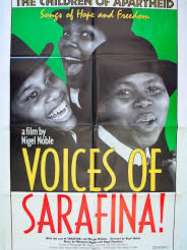
Voices of Sarafina! (1988)
, 1h25Réalisé par Nigel Noble
Origine Etats-Unis
Genres Documentaire
Thèmes Afrique post-coloniale, Le racisme, Documentaire sur la discrimination, Documentaire sur le droit, Documentaire sur une personnalité, Documentaire sur la politique, Politique
Acteurs Leleti Khumalo
Note65%





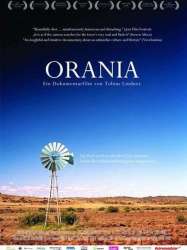
Orania (2013)
, 1h34Genres Documentaire
Thèmes Afrique post-coloniale, Le racisme, Documentaire sur la discrimination, Documentaire sur le droit, Documentaire sur une personnalité, Documentaire sur la politique, Politique
Note69%





In the town of Orania, 800 white Afrikaans people form an independent community. Their town is private property (bought in 1990) and they live independently from multicultural South Africa. Since the fall of apartheid, increasing crime levels, unemployment and social pressure has led to a small migration of people towards the town. In the town, the residents concentrate on preserving their shared culture. Residents stay in the town for their cultural ideals or for the town's safety and opportunities, and others stay out of desperation.
 , 58minutes
, 58minutesOrigine Etats-Unis
Genres Documentaire
Thèmes Afrique post-coloniale, Le racisme, Documentaire sur la discrimination, Documentaire sur le droit, Documentaire sur une personnalité, Documentaire sur la politique, Politique
Note64%





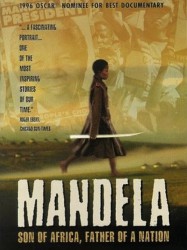
Mandela (1996)
, 1h58Genres Documentaire, Historique
Thèmes Afrique post-coloniale, Le racisme, Documentaire sur la discrimination, Documentaire sur le droit, Documentaire sur une personnalité, Documentaire sur la politique, Politique
Note69%





Un documentaire qui raconte la vie du leader sud-africain Nelson Mandela. Mandela est probablement mieux connu pour ses 27 ans d'emprisonnement, et pour mettre fin à l'apartheid. Mais ce film met aussi en lumière le première période méconnue de la vie de Mandela

Death of Apartheid (1995)
, 50minutesRéalisé par Mick Gold
Origine Royaume-uni
Genres Documentaire
Thèmes Afrique post-coloniale, Le racisme, Documentaire sur la discrimination, Documentaire sur le droit, Documentaire sur une personnalité, Documentaire sur la politique, Politique
Note66%






As We Forgive (2008)
Genres Documentaire
Thèmes Afrique post-coloniale, Le racisme, Documentaire sur la discrimination, Documentaire sur le droit, Documentaire sur la guerre, Documentaire historique, Documentaire sur une personnalité, Documentaire sur la politique, Politique
The film tells the story of two Rwandan women who come face-to-face with the neighbors who slaughtered their families during the 1994 genocide, and their personal journeys toward forgiveness. Featuring in-depth interviews with both survivors and murderers, As We Forgive provides an intimate, first-hand view of the encounters between genocide perpetrators and their victims’ families.
 Connexion
Connexion